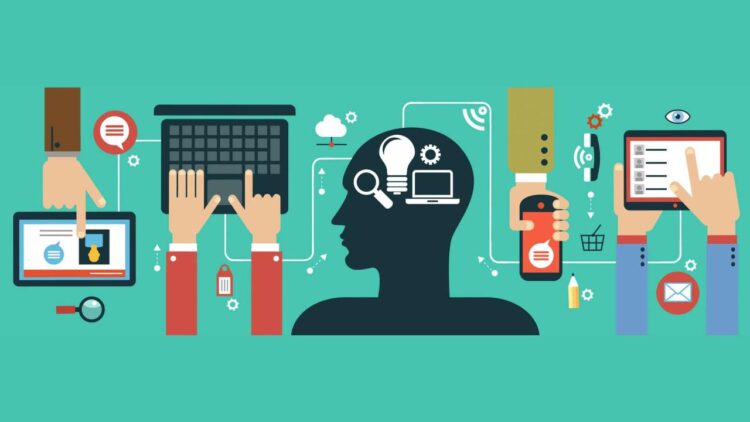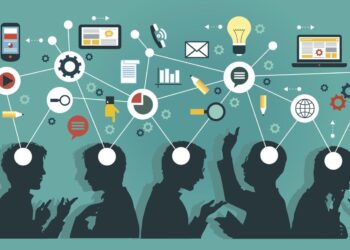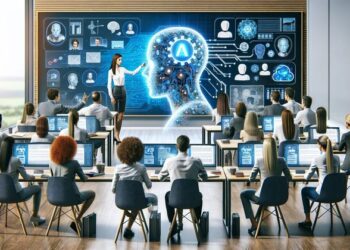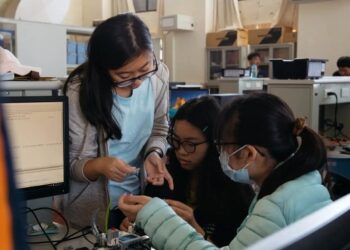In the rapidly evolving landscape of the 21st century, the ability to read, write, and compute traditionally defined literacy. However, with the pervasive integration of technology into every facet of life – from communication and commerce to education and civic participation – a new, equally critical form of literacy has emerged: digital literacy. This isn’t merely about being able to use a computer or navigate the internet; it’s a comprehensive set of skills, knowledge, and attitudes that enable individuals to find, evaluate, create, and communicate information effectively and ethically in a digital world. As technology continues its relentless advance, digital literacy is no longer just a useful skill; it has become an absolute imperative for personal empowerment, economic opportunity, and active citizenship.
The Pillars of Digital Literacy

Digital literacy is a multi-faceted concept, encompassing a wide range of competencies that go beyond mere technical proficiency. It involves critical thinking, problem-solving, and a nuanced understanding of the digital environment. To truly be digitally literate, an individual must master several interconnected areas.
A. Information Literacy in the Digital Age:
At its core, digital literacy builds upon traditional information literacy, but with the added complexities of the digital realm.
- Finding and Accessing Information: This involves knowing how to effectively use search engines (beyond basic queries), navigate complex websites, utilize databases, and access information from various digital sources. It includes understanding keywords, Boolean operators, and advanced search techniques to pinpoint relevant data.
- Evaluating Information Critically: In an era of rampant misinformation and disinformation, this is arguably the most crucial aspect. Digitally literate individuals can assess the credibility of online sources, identify biases, differentiate between fact and opinion, and understand the provenance of digital content. This involves checking domain names, author credentials, publication dates, and cross-referencing information.
- Organizing and Storing Information: Effectively managing digital files, using cloud storage, and knowing how to bookmark and categorize online resources are vital for efficient information retrieval and long-term use. This also includes understanding version control and file formats.
B. Communication and Collaboration Skills:
The digital world has revolutionized how we connect and work together. Digital literacy in this domain focuses on effective and appropriate interaction.
- Effective Digital Communication: This means knowing how to choose the right digital tool for a message (email, instant messaging, video call), crafting clear and concise messages, and understanding digital etiquette (netiquette). It also involves adapting communication styles for different digital audiences and platforms.
- Online Collaboration: Leveraging collaborative tools like shared documents, project management software, and virtual meeting platforms to work effectively with others remotely. This includes understanding roles, responsibilities, and maintaining clear communication in a digital team setting.
- Building Online Presence: Understanding how to manage one’s digital footprint and professional online identity. This includes awareness of privacy settings, content sharing, and the long-term impact of online interactions.
C. Digital Content Creation and Innovation:
Beyond consuming information, digital literacy empowers individuals to create and contribute to the digital landscape.
- Producing Digital Content: This involves using various software and applications to create diverse digital content, such as documents, presentations, spreadsheets, basic images, audio clips, and simple videos. It also includes understanding file types and compatibility.
- Understanding Digital Storytelling: The ability to convey narratives and information effectively using multimedia elements, engaging audiences through digital platforms. This might involve basic video editing, graphic design principles, or podcast creation.
- Basic Coding and Computational Thinking: While not every digitally literate person needs to be a programmer, understanding the fundamentals of computational thinking (decomposition, pattern recognition, abstraction, algorithms) and perhaps some basic coding concepts provides a deeper understanding of how digital systems work and fosters problem-solving skills.
- Leveraging Emerging Technologies: A willingness and ability to adapt to and experiment with new digital tools and platforms as they emerge, understanding their potential applications and implications.
D. Digital Safety and Cybersecurity Awareness:
Navigating the digital world safely and responsibly is a cornerstone of digital literacy.
- Protecting Personal Information: Understanding privacy settings, recognizing phishing attempts, and knowing how to create strong passwords and use two-factor authentication are critical.
- Online Security Practices: Awareness of cybersecurity threats like malware, viruses, and ransomware, and knowing how to use antivirus software, firewalls, and secure networks.
- Recognizing and Reporting Cyberbullying/Harassment: Understanding the nature of online harassment and knowing how to respond, report, and seek help.
- Ethical Digital Citizenship: This encompasses understanding intellectual property rights (copyright, fair use), avoiding plagiarism, respecting others’ digital rights, and engaging in respectful and constructive online discourse.
- Understanding Data Collection and Usage: Being aware of how personal data is collected by websites and apps, and understanding the implications for privacy and targeted advertising.
Why Digital Literacy is the New Imperative
The pervasive influence of technology means that digital literacy is no longer a niche skill but a fundamental requirement for success and participation in modern society. Its importance spans education, employment, civic life, and personal well-being.
A. Essential for Modern Education:
Schools are rapidly integrating digital tools, making digital literacy critical for student success.
- Accessing and Engaging with Learning Resources: From online textbooks and research databases to collaborative project platforms and virtual classrooms, students need digital literacy to access and interact with contemporary educational materials.
- Developing 21st-Century Skills: Digital environments naturally foster critical thinking, problem-solving, collaboration, and creativity, which are all vital skills for future success.
- Personalized Learning and Self-Paced Education: Many modern educational models leverage digital tools for personalized learning pathways, requiring students to be self-directed and digitally proficient.
- Preparation for Higher Education: Universities and colleges increasingly expect students to possess strong digital literacy skills for research, online courses, and digital assignments.
B. A Gateway to Economic Opportunity:
In the globalized, digital economy, digital literacy is a non-negotiable skill for virtually every profession.
- Workforce Readiness: Most jobs, even those traditionally considered non-digital, now require some level of digital proficiency – from using office software and communicating via email to analyzing data or utilizing specialized industry applications.
- Access to Remote Work: The rise of remote and hybrid work models necessitates strong digital communication, collaboration, and self-management skills in a digital environment.
- Entrepreneurship and Innovation: Digital literacy empowers individuals to leverage online platforms for business, marketing, and reaching global audiences, fostering entrepreneurial endeavors.
- Continuous Upskilling and Reskilling: The rapid pace of technological change means that workers must constantly learn new digital tools and skills. Digital literacy provides the foundation for this continuous professional development.
- Reduced Digital Divide in Employment: Bridging the digital literacy gap can significantly reduce unemployment and underemployment, particularly in marginalized communities.
C. Fostering Active and Responsible Citizenship:
Digital platforms are central to civic engagement, requiring citizens to be digitally savvy to participate effectively.
- Informed Decision-Making: Accessing and critically evaluating news, political discourse, and public information online is crucial for informed civic participation and democratic processes.
- Civic Engagement and Advocacy: Digital tools enable citizens to voice their opinions, participate in online discussions, organize advocacy campaigns, and engage with government bodies.
- Understanding Digital Rights and Responsibilities: Being aware of online privacy laws, freedom of speech in digital spaces, and the responsibilities that come with digital interactions is vital for ethical citizenship.
- Combating Misinformation: Digitally literate citizens are better equipped to identify and challenge fake news, propaganda, and online manipulation, contributing to a more informed public sphere.
D. Enhancing Personal Well-being and Social Connection:
Beyond formal settings, digital literacy impacts daily life and personal growth.
- Effective Communication with Loved Ones: Staying connected with family and friends across distances through various digital communication channels.
- Access to Essential Services: Online banking, healthcare portals, government services, and e-commerce all require digital proficiency.
- Personal Enrichment: Accessing educational content, entertainment, hobbies, and communities of interest through digital platforms.
- Managing Digital Footprint: Understanding how one’s online activities create a digital footprint and how to manage it responsibly for personal safety and reputation.
Strategies and Approaches
Developing widespread digital literacy requires a concerted effort across educational institutions, governments, workplaces, and communities. It’s an ongoing process that demands adaptive strategies.
A. Integrating Digital Literacy into Curriculum:
Digital literacy should not be treated as a standalone subject but woven into the fabric of all disciplines.
- Early Childhood Introduction: Introducing foundational digital concepts and safe technology use from an early age, focusing on computational thinking and creative digital play.
- Across All Subjects: Teaching students how to research effectively for history projects, use spreadsheets for science experiments, create digital presentations for literature analysis, and collaborate online for group assignments.
- Project-Based Learning: Designing projects that inherently require digital skills, such as creating a website, producing a podcast, or analyzing large datasets.
- Dedicated Digital Citizenship Education: Explicitly teaching about online safety, privacy, cyberbullying, ethical use of information, and responsible online behavior.
B. Professional Development for Educators:
Teachers are at the forefront of imparting digital literacy, making their own proficiency paramount.
- Upskilling and Reskilling: Providing continuous training for educators on new digital tools, pedagogical strategies for integrating technology, and best practices for fostering digital literacy.
- Lead by Example: Encouraging teachers to model effective and ethical digital practices in their own professional work and classroom interactions.
- Collaborative Learning Networks: Creating opportunities for teachers to share experiences, troubleshoot challenges, and learn from each other regarding digital literacy integration.
C. Lifelong Learning Initiatives for All Ages:
Digital literacy is not a one-time achievement; it requires continuous learning throughout life.
- Community Learning Centers: Public libraries and community centers can offer workshops and one-on-one assistance for adults and seniors on essential digital skills, from basic computer use to internet safety.
- Workplace Training Programs: Companies should invest in ongoing digital literacy training for their employees to ensure they are proficient with evolving tools and industry best practices.
- Online Resources and MOOCs: Making accessible online courses and resources available for individuals to independently enhance their digital skills at their own pace.
D. Policy and Infrastructure Development:
Governments and policymakers play a crucial role in creating an enabling environment for digital literacy.
- Universal Access to Broadband and Devices: Investing in infrastructure to ensure affordable and reliable internet access for all citizens, and initiatives to provide devices to underserved populations.
- National Digital Literacy Frameworks: Developing comprehensive frameworks that outline key digital competencies across different age groups and educational levels.
- Funding for Digital Literacy Programs: Allocating resources to support schools, libraries, and community organizations in delivering digital literacy education.
- Cybersecurity Awareness Campaigns: Public campaigns to educate citizens about online risks and best practices for digital safety.
Challenges and the Road Ahead
Despite its undeniable importance, the path to universal digital literacy is fraught with challenges that must be systematically addressed.
A. The Ever-Evolving Digital Landscape:
Technology changes at an astonishing pace, making it difficult to keep curricula and skills current.
- Continuous Adaptation: Digital literacy initiatives must be designed with flexibility, capable of adapting to new technologies and emerging digital trends rather than being rigid.
- Focus on Foundational Principles: While tools change, the underlying principles of critical evaluation, ethical use, and effective communication remain constant. Education should emphasize these timeless competencies.
B. The Digital Divide:
Significant disparities in access to technology and digital skills persist, both globally and within countries.
- Socioeconomic Factors: Income, geography, and education levels continue to be major determinants of digital access and proficiency. Bridging this gap requires targeted interventions and investment.
- Generational Gaps: While younger generations are often considered “digital natives,” their proficiency is often limited to consumption rather than critical creation or responsible use. Older generations may face barriers to adopting new technologies.
- Disability and Accessibility: Ensuring digital tools and literacy programs are accessible for individuals with disabilities requires conscious design and implementation efforts.
C. Misinformation and Disinformation:
The ease with which false information spreads online poses a grave threat to informed societies.
- Enhanced Critical Thinking Skills: Education must explicitly teach advanced critical thinking skills to help individuals discern credible sources from unreliable ones, and understand the motivations behind online content.
- Media Literacy Beyond Text: Expanding media literacy to encompass visual, audio, and algorithmic biases, recognizing deepfakes, and understanding the persuasive techniques used in digital media.
- Promoting Responsible Sharing: Educating individuals about the impact of sharing unverified information and fostering a culture of responsible online discourse.
D. Cybersecurity Threats and Privacy Concerns:
As our lives move online, the risks of cybercrime and privacy breaches escalate.
- Proactive Education: Continuous education on emerging cyber threats, phishing scams, and data privacy best practices is essential.
- User Empowerment: Empowering individuals to take control of their privacy settings, understand terms of service, and make informed choices about sharing their data.
- Ethical AI Use: As AI becomes more prevalent, understanding its ethical implications for data privacy and algorithmic bias becomes a crucial aspect of digital literacy.
E. Funding and Political Will:
Sustained investment and strong political commitment are necessary to drive widespread digital literacy.
- Prioritization: Digital literacy must be recognized as a national priority, akin to traditional literacy and numeracy.
- Public-Private Partnerships: Collaboration between governments, educational institutions, private companies, and non-profits is essential to pool resources and expertise.
Conclusion
The journey towards a universally digitally literate society is continuous and complex, but it is an endeavor that holds the key to individual empowerment, societal progress, and economic prosperity in the 21st century. By prioritizing digital literacy across all age groups and sectors, we can ensure that every individual is equipped not just to survive, but to thrive and contribute meaningfully in our increasingly digital world. This is the new imperative.













